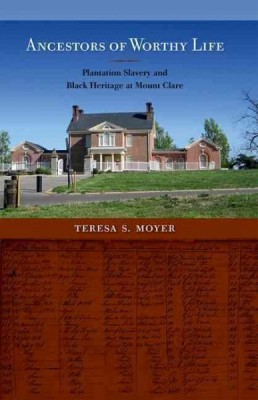| Ancestors of Worthy Life: Plantation Slavery and Black Heritage at Mount Clare Contributor(s): Moyer, Teresa S. (Author) |
|
 |
ISBN: 081306046X ISBN-13: 9780813060460 Publisher: University Press of Florida OUR PRICE: $74.20 Product Type: Hardcover - Other Formats Published: January 2015 |
| Additional Information |
| BISAC Categories: - History | African American - Social Science | Slavery - Business & Economics | Museum Administration And Museology |
| Dewey: 306.362 |
| LCCN: 2014027981 |
| Series: Cultural Heritage Studies (Hardcover) |
| Physical Information: 0.7" H x 6" W x 9" (1.00 lbs) 240 pages |
| Themes: - Ethnic Orientation - African American - Locality - Baltimore, Maryland - Geographic Orientation - Maryland - Topical - Black History |
| Descriptions, Reviews, Etc. |
| Publisher Description: "A tour de force. Moyer goes beyond critique to give us a richly contextualized study, demonstrating that inclusive interpretation of plantation and other historic house museum sites can be done and that the failure to do so is a political act rooted in systemic racism."--David T. Palmer, University of Louisiana at Lafayette "An uncommonly detailed, frank, and balanced discussion of racialized practice at a historic site museum."--Kirsti Uunila, historic preservation planner, Calvert County, Maryland Enslaved African Americans helped transform the United States economy, culture, and history. Yet these individuals' identities, activities, and sometimes their very existence are often all but expunged from historically preserved plantations and house museums. Reluctant to show and interpret the homes and lives of the enslaved, many sites have never shared the stories of the African Americans who once lived and worked on their land. One such site is Mount Clare near Baltimore, Maryland, where Teresa Moyer pulls no punches in her critique of racism in historic preservation. In her balanced discussion, Moyer examines the inextricably entangled lives of the enslaved, free blacks, and white landowners. Her work draws on evidence from archaeology, history, geology, and other fields to explore the ways that white privilege continues to obscure the contributions of blacks at Mount Clare. She demonstrates that a landscape's post-emancipation history can make a powerful statement about black heritage. Ultimately she argues that the inclusion of enslaved persons in the history of these sites would honor these "ancestors of worthy life," make the social good of public history available to African Americans, and address systemic racism in America. |